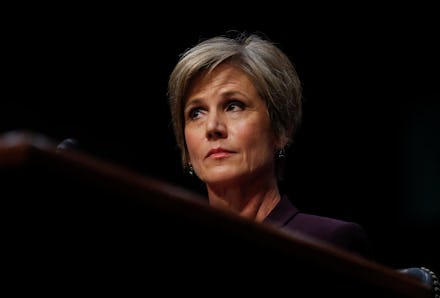Sally Yates Testimony: 3 key takeaways

After repeated delays and attempts to stifle her testimony, former acting Attorney General Sally Yates finally testified before Congress on Monday. In a Senate judiciary subcommittee hearing about Russian interference in the 2016 election, Yates testified alongside former Director of National Intelligence James Clapper and she did not disappoint.
Here are the main takeaways.
The White House ignored Yates' warnings about Michael Flynn
During Monday's hearing Yates revealed that, in the early days of the Trump administration, she had spoken with the White House Counsel's office twice in person and once by phone in order to warn the White House the then-National Security Adviser Michael Flynn was vulnerable to Russian blackmail after lying to Vice President Mike Pence.
Yet the White House waited another 18 days to fire Michael Flynn and only did so after the Washington Post got word that Yates had tried to alert the White House to the matter.
White House press secretary Sean Spicer has since sought to re-characterize Yates's initial warnings by saying in a February press briefing she simply "wanted to give a heads up to us on some comments that may have seemed in conflict with what [Flynn] had sent the vice president."
Yates' testimony Monday indicated that she took the matter far more seriously than Spicer would have reporters believe.
Republicans would please like to talk about anything else
Though the focus of Monday's hearing was supposed to be about Russia's involvement in the 2016 election, the Republicans on the committee limited their questions on the matter to just a handful.
Even after hearing that Yates had repeatedly tried to sound the alarm on Flynn, Republicans seemed far more interested in the origins of leaks to the press and the president's twice-rejected travel ban on majority-Muslim countries.
In question after question, Republicans asked Yates if she had been involved in any of the leaks about Flynn or the unmasking of the names of Trump officials in intelligence reports.
When those questions didn't yield any satisfactory answers, they turned to Trump's executive order banning immigrants from several Muslim-majority countries, an order that Yates refused to defend as acting attorney general on he grounds it would not hold up in court. (It ultimately didn't, and Yates was fired for her actions.)
At one point, Clapper appeared to chastise the Republican senators for taking the hearing off track, saying, "I understand how critical leaks are, and unmasking and all these ancillary issues — but to me the transcendent issue here is the Russian interference in our election process."
Yates is an unflappable witness and the internet loves it
Monday's hearing showed Yates as a force to be reckoned with. For many in the public and the media, this was the first time they had seen Yates speak, let alone hold her ground in a series of heated exchanges with Republican senators.
Yates sternly rejected any insinuation she was involved in leaks and repeatedly swatted back Republican criticisms of her decision not to defend Trump's travel ban. As the hearing went on, her internet fan club swelled in numbers.
Given her strong performance, it's no wonder that Republicans put off a public hearing with Yates for so long.